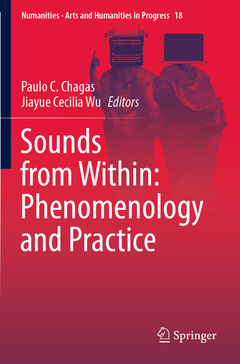Description
Sounds from Within: Phenomenology and Practice, 1st ed. 2021
Numanities - Arts and Humanities in Progress Series, Vol. 18
Coordinators: Chagas Paulo C., Cecilia Wu Jiayue
Language: English
Keywords
Sound; Phenomenology; Network music; Meditation; Sonic Art; Technology
Publication date: 06-2022
252 p. · 15.5x23.5 cm · Paperback
Publication date: 06-2021
Support: Print on demand
Description
/li>Contents
/li>Biography
/li>Comment
/li>
This book transforms phenomenology, music, technology, and the cultural arts from within. Gathering contributions by performing artists, media technology designers, nomadic composers, and distinguished musicological scholars, it explores a rich array of concepts such as embodiment, art and technology, mindfulness meditation, time and space in music, self and emptiness, as well as cultural heritage preservation. It does so via close studies on music phenomenology theory, works involving experimental music and technology, and related cultural and historical issues.
This book will be of considerable interest to readers from the fields of sound studies, science and technology studies, phenomenology, cultural studies, media studies, and sound art theory. This book is equally relevant and insightful for musicians, composers, media artists, sound artists, technology designers, and curators and arts administrators from the performing and visual arts.
Contains texts by living artists, performers, and composers who write about their own practice
Presents a wealth of cultural and technological perspectives on music phenomenology studies
Shares insights into several interdisciplinary fields: science, engineering, the humanities, and the social sciences




